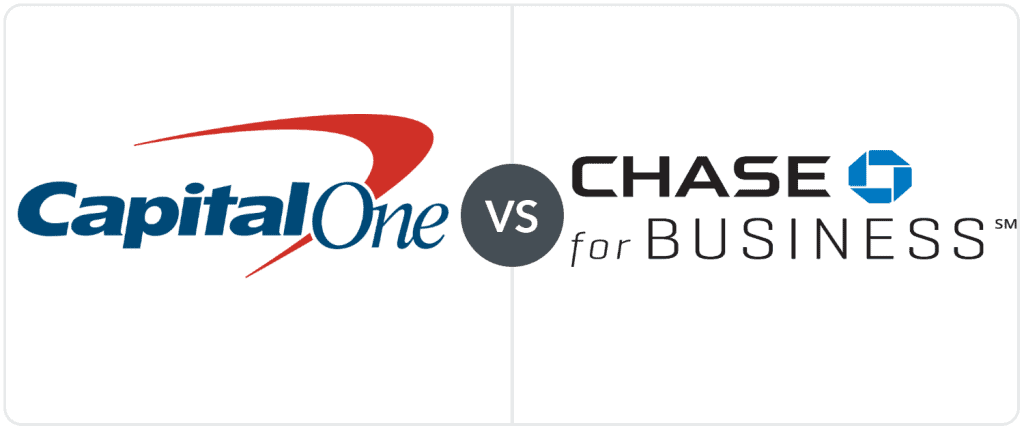Capital One VS Chase Business Banking Comparison
Capital One and Chase both offer good business checking and banking options, but when choosing between a Capital One vs Chase business account, it helps to have all the facts.

| Capital One | Chase | |
|---|---|---|
| Ideal For | Businesses with heavy cash sales | Businesses operating in multiple states |
| Services Offered |
|
|
| Banking Pricing | $15-$75/month (waivable) | $0-$95/month |
| Accounting Integrations | Xero | Various; added costs |
| Standout Features |
|
|
| What’s Missing |
|
|
Both Chase and Capital One are established names in the banking world and offer a long list of business services and features to help business owners manage their finances. But how do you decide between Chase vs Capital One? If your search for a small business bank has led you to this comparison, this post can help you decide which is better for your business.
We’ll take a look at both Chase and Capital One’s bank fees, branch availability, interest rates, and more, so you can declare a winner in this Capital One vs Chase head-to-head competition.
Table of Contents
- Chase VS Capital One Business Banking At A Glance Comparison
- Where Capital One Business Banking Shines
- Where Capital One Falls Short
- Where Chase Business Banking Shines
- Where Chase Business Banking Falls Short
- Chase VS Capital One Pricing & Fees Compared
- Capital One VS Chase Services & Features Compared
- Which Bank Is Better For Your Business, Chase or Capital One?
Chase VS Capital One Business Banking At A Glance Comparison
When it comes to business services, Chase and Capital One are neck-and-neck in terms of offerings. Both have business checking, savings, credit cards, payment processing, and even lending, so how do you choose between them?
In terms of business banking, there are some key differences between the two. Capital One is much cheaper than Chase and is the only one of the two to offer a high-yield savings option (though you can get a certificate of deposit with Chase). The next big difference is that Chase offers same-day access to funds and more advanced finance management features.
The winner will ultimately depend on which features, rewards, and fees your business is looking for.
Let’s dive into a more detailed comparison.
Where Capital One Business Banking Shines
- No minimum balances
- Unlimited free digital transactions
- Monthly fees can be waived
- Lower balances are required to waive fees
- Cash deposits accepted
- Free overdraft protection
- Merchant services through Clover POS
- Promotional APY rate
- Unlimited free digital transactions
- Xero integration
- 70,000+ ATMs through Capital One, MoneyPass, and Allpoint (as opposed to Chase’s 15,000 ATMS)
Where Capital One Falls Short
- Only has physical locations in eight states
- Potentially high balance requirements to waive fees
- Limited-time APY boost
Where Chase Business Banking Shines
- Up to $300 welcome bonus for new accounts
- Waivable monthly fees
- Linked Chase Ink business credit cards
- Built-in merchant services
- Cash bonus for new accounts
- Limits on free transactions
- No minimum opening deposit
- Free same-day access to cash from sales made using Chase’s in-house POS
- Personal finance management software integrations (with added fees)
- Physical banks in 48 states
Where Chase Business Banking Falls Short
- Limited in-person transactions
- High fees for excess cash deposits
- No high APY savings account (only a CD option)
- High monthly fees
- Larger balances are required to waive fees
Chase VS Capital One Pricing & Fees Compared
Each of these banks has monthly fees attached to business bank accounts, and each bank sets conditions under which those fees can be waived. Chase’s fees are higher than Capital One’s and more difficult to waive, though Chase offers same-day access to cash from POS sales that Capital One doesn’t. It’s a toss-up on whose cash deposit fee is higher, as it depends on how much you plan on depositing each month.
All-in-all, Capital One edges Chase out by offering lower monthly fees with lower minimum balances required to waive said fees.
Capital One offers two types of business checking accounts in addition to business savings. These accounts come with monthly fees of $15 or $35, which can be waived with minimum balances of $2,000 or $25,000, respectively.
In terms of other fees, Capital One has no ACH fees and no mobile deposit fees on either plan. Wire transfer fees and cash deposit fees vary based on whether you go with the Basic Checking or Enhanced Checking account.
Chase offers three business checking accounts, and they come with monthly fees from $15-$95 that can be waived if you keep a minimum daily balance of at least $2,000-$100,000, depending on your account level.
In terms of other fees, Chase offers unlimited debit transactions and Chase ATM transactions. Cash deposit, wire transfer, and ACH fees vary depending on whether you go with the Chase Business Complete Banking, Chase Performance Business Banking, or the Chase Platinum Business Checking account.
Both Capital One and Chase waive savings account fees if you open both checking and savings accounts.
Capital One VS Chase Services & Features Compared
Both Capital One and Chase are reputable banks with solid banking features.
For checking accounts, both offer expense tracking, cash flow management, business checks, fraud protection services, and more. For savings accounts, both offer FDIC insurance and mobile apps.
There are many minute differences between each bank’s features, but the main differences are as follows.
Only Capital One Offers
- High-yield savings options with up to 4.10% APY
- Overdraft coverage
Only Chase Offers
- Same-day transfer options
- Cash flow management
- Autosave features to build your savings account more easily
- Certificate Deposit options
Which Bank Is Better For Your Business, Chase or Capital One?
Both Chase and Capital One have much to offer small business customers, and your decision will come down to your personal preferences and feature needs.
Capital One has lower fees and higher interest-earning options than Chase, plus way more ATMs. However, Chase has more physical locations if you want to bank in-person and has more advanced cash management features. Here are some other factors to keep in mind when deciding between the two:
Choose Chase For Banking If …
- You want to apply online or at a branch near you
- You’d like same-day access to funds from sales
- You want a bank with nationwide reach
- Your business is not heavy on cash sales (less than $20,000/month in cash deposits needed)
- You want to link your banking with your accounting system (and you don’t mind paying to do so)
- You want cash flow management features
Choose Capital One For Banking If …
- You are comfortable with applying and banking online since there are only eight in-person branches
- You want to link your business bank account to some of the best business credit cards available
- You’re looking for a savings option with a high APY (at least for a promotional period)
- You need to be able to deposit large amounts of cash (up to $40,000/month) and want to avoid paying fees
- You use Xero for your business accounting and want to integrate accounting and banking
Still not convinced either of these business banking options is right for you? Check out our picks for the best online business bank accounts and avoid having to apply at a local branch altogether. If you’re self-employed, look for a bank account for freelancers and independent contractors to find the best option for your needs
Once you’ve picked the business bank account for you, be sure to check out our guide on how to open a business bank account to get started.












